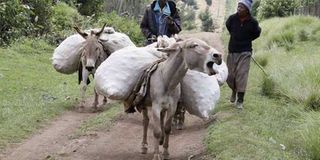Ready markets for small-scale farmers will enhance need to produce more - report

Farmers in Nakuru use donkeys to transport potatoes to the market after harvest. Scientists have recommended that the government must deliberately assist small-scale farmers to access markets to sell their produce in order to enhance the need to produce more. PHOTO | SULEIMAN MBATIAH | NATION MEDIA GROUP
What you need to know:
- Connecting peasants to urban centres would generate employment that would motivate them to produce more.
- 83 per cent of the farm households sell part of their crop produce and only 4 per cent of the farmers do not sell anything of their crop or livestock produce.
- Households in market-constrained environments need more land to achieve sufficiency as they will rely more on livestock
Scientists have recommended that the government must deliberately assist small-scale farmers to access markets to sell their produce in order to enhance the need to produce more.
The report, Drivers of Household Food Availability in Sub-Saharan Africa, published in this month’s Proceedings of the National Academy of Sciences website, said that while a lot has been done to help increase food production, incomes and nutritional matters could best be addressed by helping the poor to sell the little they have.
The Nairobi-based International Livestock Research Institute (ILRI) monitored 13,000 peasant households in Kenya and 16 other countries across Africa and realised that food security can best be achieved by empowering the peasants gain some economic power.
“83 per cent of the farm households sell part of their crop produce and only 4 per cent of the farmers do not sell anything of their crop or livestock produce. The poorest farmers sell eggs while the more endowed sell milk.
“This income helps them buy what they do not have, thereby helping improve nutritional intake at the table,” says Dr Mark van Wijk, the report’s lead author.
CONNECT TO URBAN CENTRES
It adds that connecting peasants to urban centres would generate employment that would motivate them to produce more.
“Farmers start selling farm produce even before they have met their own needs and the only way to enhance food self-sufficiency is to increase market access.
“It will spur productivity of cash crops and intensified livestock production,” it says.
The study jointly carried out by scientists from CGIAR research programmes on livestock and fish, integrated systems for the humid tropics and climate change, agriculture and food security noted that off-farm income contributed to food availability by up to 12 per cent for households without enough food and up to 27 per cent for the households with sufficient food.
“Consumption of self-produced food crops did not cover the food need for almost 80 per cent of the households. Livestock only provided about 20 per cent of the food needed.
“Households in market-constrained environments need more land to achieve sufficiency as they will rely more on livestock,” the report adds.





